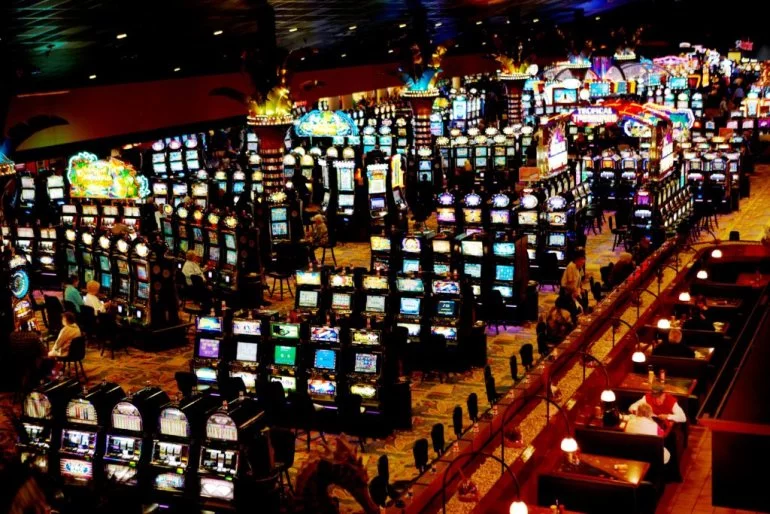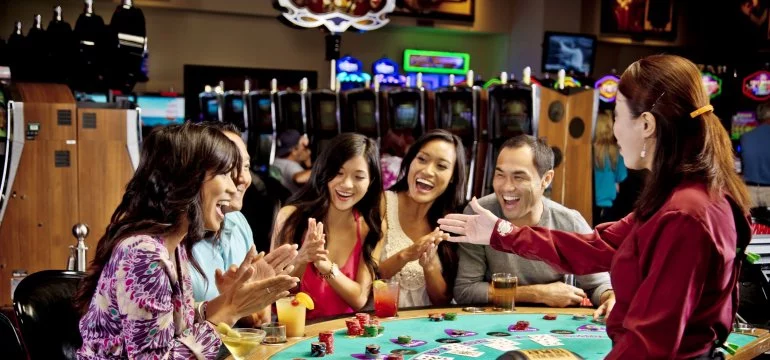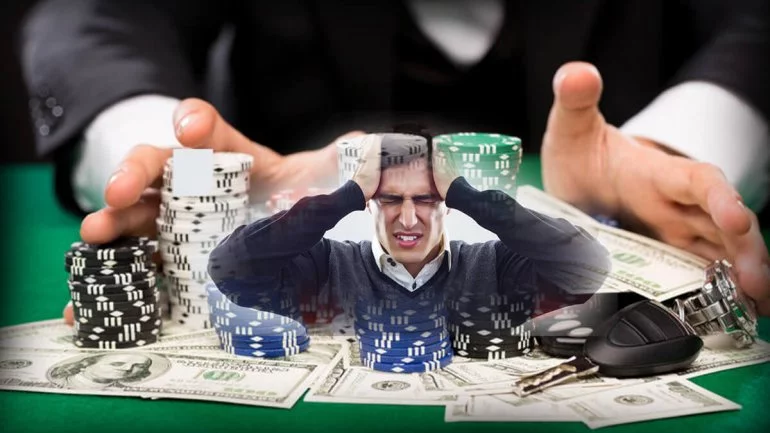Casinos use various psychological techniques to enhance gambling enjoyment and encourage their visitors to spend more time and money. Surprisingly, most of these tactics are simple and often go unnoticed. In this article, you will learn about the near-win phenomenon, the gambler's fallacy, and how even feng shui favors casinos.
Do you know what psychological tricks casinos employ to keep you playing longer and make you spend more money? How do they leverage even feng shui to their advantage? Find out all about it in our article.
Casinos and Psychology
If you're lucky, you can make a fortune in gambling. However, from another perspective, casinos are designed to make money, not give it away. All gambling games, whether it's roulette, blackjack, or slots, are created so that the probability of losing is always greater than the probability of winning. Of course, nobody would play a game where out of ten bets, you get nine losses. But in any game, there will be more losses than wins.
Therefore, in the long run, no casino game will bring you profit if you play honestly and correctly. This raises the question: why do players continue to place bets, knowing they will eventually lose?
Psychologists have discovered that casino gambling is a carefully crafted psychological trap, starting with the rules of the games and ending with the layout of the gambling clubs. Everything is designed so players constantly receive psychological "rewards" and do not quit the game, even if they lose money. And Eastern casinos are even built according to feng shui rules, where every detail has hidden meanings.

Macau Lisboa Casino
Let's consider this using the example of the famous Macau Lisboa Casino, known as the triumph of feng shui. Guess whose favor feng shui works in, even if the slogan of this casino says:
"You can't win in gambling; small bets can be enjoyable. Come and play in your free time to have fun."
Both the old Lisboa Hotel building, built in 1971, and the new Grand Lisboa building, opened in 2007, were constructed considering the advice of feng shui masters, who received fantastic fees for their work.
- The design of the Lisboa Hotel resembles a birdcage, signifying that every player entering the casino is like a bird in a cage.
- On the fresco of the lobby ceiling, there is a ship sailing on waves with billowing sails, signifying that players surrender themselves to the forces of nature - the wind and waves - when entering the casino.
- In general, the lobbies of both Lisboa buildings are beautifully designed and filled with paintings, sculptures, jade, and other works of art that Stanley Ho collected over the years. While Lisboa Hotel probably has twice as many exhibits, the Grand Lisboa lobby showcases the Star of Stanley Ho. It is the world's largest 218.08-carat D-color diamond, ranking sixth among all "flawless" diamonds. According to feng shui, it symbolizes success and represents timeless quality.
- Furthermore, in the Grand Lisboa hall, there are other symbols of success - a massive pearl vase in the form of a fountain, a golden dragon, and a golden ship laden with gold.
- The new Grand Lisboa building, constructed in a certain way, evokes different associations in different people, but they all contribute to the financial success of the casino. For some, the building resembles an upside-down hanging bat, an animal associated with blood-sucking, implying that the building drains money from casino customers. For others, the structure resembles a lotus flower emerging from an egg. In the SJM company itself, they believe that the base of the building resembles a Fabergé egg, and the upper part resembles the feathers on the heads of Brazilian dancers. In any case, all associations are linked to luxury and wealth.
- Both buildings are constructed to have a waterfront view. This is not coincidental, as in the Cantonese dialect, "water" has a secondary meaning - "money."
How Casinos Use Light, Color, and Scent
The gambling industry has always employed various methods to encourage people to participate in gambling activities. For this reason, they have invested significant resources in researching human psychology, which plays a crucial role in marketing gambling games. Players must continue playing even if they are losing money.
Dr. Mark Griffiths, Professor of Gambling Studies in the Psychology Division at Nottingham Trent University in the United Kingdom, has spent nearly thirty years studying addictive behavior, focusing on gambling addiction. He has delved into many secrets of casinos and discovered that most gambling clubs attempt to fill their interior space with slot machines because they are the most profitable gaming process.
The restaurant in a casino is typically located in the middle or at the back of the interior space, so players have to cross the gaming area before and after eating. With the same objective, casinos also intentionally create winding paths to prolong guests' stay in the gaming zone and encourage them to place more bets. Dr. Griffiths recalls attending a concert at the MGM Arena in Vegas. As he made his way to the venue, he passed thousands of slot machines and gaming tables. After the show ended, he had to walk past them all again.

Research has shown that color is associated with specific emotional states and affects blood pressure, respiration, and arousal. For example, red color elicits excitement, blue color provides a sense of comfort and safety, and reddish lighting prompts people to make larger bets compared to blue lighting. Many casinos in the US offer complimentary alcoholic beverages to their guests, hoping that your ability to make rational judgments will diminish under the influence of alcohol, making you more likely to become an impulsive gambler.
Casinos always have low ambient noise or background music, creating a sense of interest and excitement among people. Music can amplify arousal or relax individuals. Studies have shown that the more music shoppers hear in supermarkets, the more purchases they make.
The same applies in casinos: the louder the background music, the faster guests make bets.
When you win money on a slot machine, it also plays celebratory music, chimes, or buzzes, and the falling coins hit a metal plate with a loud sound. This auditory backdrop makes you feel that winning is easier than losing because you usually lose money while the slot machine remains silent!
A smell can also influence gambling behavior. Experiments conducted in Las Vegas casinos in the United States have shown that diffusing pleasant scents in the slot machine area can increase the number of bets placed by guests. Griffiths believes this is the same principle used by some shopping centers, which spray the aroma of chocolate on Valentine's Day to boost sales.

When players feel physically and mentally comfortable, they prolong their stay in the casino. For example, providing guests with seating options can reduce fatigue and significantly enhance comfort, which is why casinos offer snack trays, tea, and other beverages. Additionally, some compulsive gamblers are reluctant to leave a slot machine or roulette table to purchase drinks or food out of fear that someone else will take their "lucky spot."
Thus, we can highlight the following psychological tricks employed by casinos:
- Prolonging guests' stay in the gaming zone.
- Utilizing color.
- Using lighting.
- Offering free alcohol.
- Low ambient noise or background music.
- Exciting sound effects during wins.
- Diffusing pleasant scents in the slot machine area.
- Providing guests with seating options - making them comfortable.
- The psychological trap of near-winning.
- The perception of winning more money than losing.
The Near-Win Phenomenon
A survey conducted in the UK revealed that players tend to be blindly optimistic during gameplay and believe they have won more money than they have lost. This is incorrect since casinos always have the edge. Griffiths discovered that players' perception is biased. They always think about how many times they have won, "forgetting" about when they lost. People who frequently engage in gambling are more likely to make these errors.
Most players cannot stop playing even if they know they are losing more money than winning. Griffiths believes the reason is simple: players regularly receive rewards for their gameplay. They receive monetary and physical rewards such as excitement, tension, and adrenaline when they win money. Congratulatory remarks from other players and spectators further excite them and create a spiritual reward.

Griffiths' research has shown that the most intriguing psychological reward in gambling is the near-win. Gambling methods, such as slot machines, are designed to give people a strong sense of almost winning. When you study and train for a practical skill, the feeling of nearly achieving is valuable feedback that tells you your efforts have not been in vain and that you are very close to your goal, motivating you to continue working diligently.
Yet, in gambling, where winning or losing solely depends on luck, the near-win is useless and even harmful. Regardless of how close the previous game was to a win, it has no impact on the outcome of the next round.
Dr. Griffiths connected heart rate monitors to players while they gambled. It was observed that the heart rate significantly increased when they won and during a near-win. The level of physiological arousal was the same, even though a near-win is technically a loss. This helps us understand why players continue to place bets even if they keep losing.
Mark Griffiths shares his research findings:
One of the most significant observations in my research was that regular players personified the slot machine and often interacted with it as if it were a person. They attributed mental processes to it and spoke to it as if it could hear them.
Another interesting observation pertained to the psychology of near wins. Regular players often explained their losses and transformed losing situations into nearly winning ones. At a cognitive level, players didn't always lose; they constantly almost won, which, as I argued, served as a psychological and physiological reward for them.
Gambler's Fallacy in Casinos
Dr. Griffiths explains the meaning of the gambler's fallacy.
The gambler's fallacy is the misconception when players believe that the outcome of a previous bet will influence the next one. It is a set of beliefs held by many players that determines their next choice. The player looks back at past results - for example, three consecutive losses when betting on black in roulette - and decides that the law of averages, Lady Luck, or something else influences the outcome to be red this time.
Of course, this is not true. Each spin of the roulette wheel has an equal chance of landing on specific colors or numbers. The gambler's fallacy has no predictive power. One can only be sure of what has occurred in the past, and that knowledge has no bearing on what will happen next.

Under the influence of the gambler's fallacy, they receive near-wins as rewards, which makes them even more determined to stick to their betting strategy. Just a little more, almost there, because they've nearly won... the anticipation of winning money encourages them to continue playing.
Tests conducted by Dr. Griffiths have confirmed that the physical arousal from a near-win is nearly the same as the excitement from an actual win.
Therefore, players believe they are "almost winning money despite constant losses." They genuinely feel like they are constantly winning!
Mind Liberation
When you use your hard-earned money in a game, you inevitably think and worry about it as you place your next bet. It's very unpleasant to lose real money. Casinos widely use chips to "liberate your mind" and conceal the value of real money. Players exchange banknotes for chips, and voila! - making bets is no longer as scary because you're not wagering actual money.
Lately, more and more casinos are using smart cards, claiming they provide guests convenience. In reality, they replicate the trick regular retailers use - research has shown that consumers spend more money in stores when using credit cards. It turns out that card users not only find it easy to manage, but they also feel less guilty about excessive spending. In casinos, smart cards also speed up money expenditure - players no longer need to waste time constantly inserting coins or banknotes into slot machines. Just insert the card once and play until the money runs out.

Another secret function of smart cards is collecting data about players' behavior. Age, occupation, time spent playing, bet sizes - all of this is meticulously recorded and analyzed in the casino's data centers. Some less scrupulous gambling clubs use this information to introduce various "discounts" at specific moments during the gameplay.
What Should You Always Remember?
People abandon any activity if they don't receive encouragement or reward - this applies to everything from exercises to games. This reaction is constantly exploited while you're playing at a casino. Remember this to avoid becoming one of the players who can't break free from pursuing near-wins.
Remember the psychological tricks the next time you visit a casino, and use this knowledge to your advantage. You'll enjoy much more by remembering that no matter how hard the casino tries to outsmart you, ultimately, you are in control of your actions. And then, gambling will not become a problem for you.















